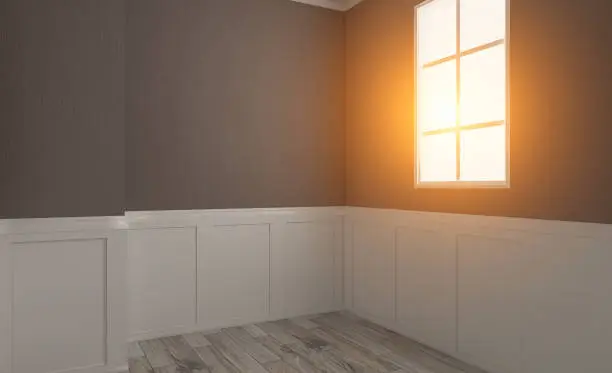Half wall paneling is a timeless design choice that adds character and functionality to any space. Whether you want to enhance your home’s aesthetic appeal or add a protective layer to your walls, half wall paneling offers a versatile solution. This design trend has surged in popularity due to its ability to blend traditional charm with modern styles. This article will explore everything you need to know about half wall paneling, including its benefits, various styles, installation tips, and much more. By the end, you’ll have all the knowledge to incorporate half wall paneling into your next home project.
1. What is Half Wall Paneling?

Half wall paneling, also known as wainscoting, is a decorative feature in which paneling is applied to the lower portion of a wall, typically covering one-third to half its height. It originated as a way to protect walls from damage in high-traffic areas but has since become a design staple.
- Common Materials: Wood, MDF, PVC, and laminate.
- Height Range: Usually between 32 to 42 inches.
- Uses: Adds insulation, protects walls, and enhances décor.
This paneling type suits various spaces, from dining rooms and bathrooms to hallways and living areas.
2. Benefits of Half Wall Paneling

Installing half wall paneling provides both practical and aesthetic advantages:
- Aesthetic Appeal: Adds depth and texture to walls, creating visual interest.
- Wall Protection: Shields walls from scuffs and scratches, especially in areas prone to damage.
- Insulation: Some materials help with temperature and sound insulation.
- Customization: Easily customizable with different colors, patterns, and materials.
- Increases Home Value: Adds a premium look, which can be attractive to buyers.
Whether you aim to modernize or add vintage charm, this design feature is a win-win.
3. Popular Styles of Half Wall Paneling

There are several styles of half wall paneling to consider, depending on your home’s design:
- Beadboard Paneling: Offers a traditional look with vertical grooves.
- Flat Paneling: A minimalist design perfect for modern interiors.
- Shiplap Paneling: Horizontal boards that exude a rustic vibe.
- Raised Paneling: Features panels with beveled edges for a luxurious feel.
- Board and Batten: Adds a farmhouse or industrial touch.
Each style brings a unique character, making it easy to match your paneling with your home’s overall theme.
4. Best Rooms for Half Wall Paneling

Half wall paneling can elevate the look and function of several spaces:
- Dining Rooms: This creates a sophisticated backdrop for gatherings.
- Bathrooms: Combines moisture resistance with elegant design.
- Bedrooms: Adds coziness and personality to sleeping areas.
- Hallways: Protect walls in high-traffic zones.
- Living Rooms: Enhances the ambiance with stylish accents.
Pairing the right materials and colors with the room’s purpose ensures maximum impact.
5. How to Choose the Right Material

Selecting the best material for your half wall paneling involves considering durability, budget, and aesthetics:
- Wood: Durable and versatile but can be costly.
- MDF: Affordable and smooth, ideal for painting.
- PVC: Waterproof and low-maintenance, great for bathrooms.
- Laminate: Budget-friendly and available in various finishes.
For areas prone to moisture, such as bathrooms, opt for waterproof materials like PVC or treated wood.
6. Color Choices for Half Wall Paneling

Color can dramatically impact the overall effect of your paneling:
- Neutral Tones: White, beige, or grey for a classic and timeless look.
- Bold Colors: Deep green, navy, or black for dramatic flair.
- Two-Tone: Pairing paneling with a contrasting wall color adds dimension.
- Natural Wood Finish: Perfect for a warm and rustic ambiance.
Test colors in small sections before committing to ensure harmony with your room’s palette.
7. Step-by-Step Installation Guide

Installing half wall paneling is a manageable DIY project if you follow these steps:
- Measure and Mark: Determine the desired height and mark the wall.
- Prepare the Wall: Clean the surface and remove any obstructions like outlets or baseboards.
- Cut Materials: Cut panels and trim to size using appropriate tools.
- Attach Panels: Secure panels to the wall with adhesive and nails.
- Add Trim: Install decorative molding at the top for a polished finish.
- Paint or Stain: Apply your chosen color or finish for the final touch.
If unsure, hiring a professional ensures flawless results.
8. Maintenance Tips for Long-Lasting Paneling

To keep your half wall paneling looking new:
- Regular Cleaning: Use a damp cloth to wipe away dust and dirt.
- Avoid Harsh Chemicals: Stick to gentle cleaners to protect the finish.
- Inspect for Damage: Check for cracks, chips, or moisture issues and address them promptly.
- Repaint or Refinish: Refresh colors or finishes every few years to maintain the look.
A little care goes a long way in preserving the beauty and functionality of your paneling.
9. Historical Background of Half Wall Paneling

Half wall paneling, known as wainscoting, has been used in interior design for centuries. Originating in the 16th century, it was initially designed as a protective feature to shield walls from damage in high-traffic areas. In European homes, particularly in the Netherlands and England, wainscoting was made from oak and served both a decorative and functional purpose.
During colonial times, American homes adopted the trend, often using paneling to insulate homes during cold winters. Over the years, the focus shifted from pure functionality to aesthetics, leading to the development of diverse paneling styles, from traditional raised panels to modern minimalist designs. Today, half wall paneling is widely used to enhance home décor while preserving its original protective function.
10. Cost Breakdown and Budgeting Tips

When considering half wall paneling, understanding the costs involved helps in making informed decisions.
Estimated Cost by Material:
- Wood: £50–£150 per square meter (higher-end option, durable and elegant).
- MDF: £20–£70 per square meter (affordable and easy to paint).
- PVC: £30–£90 per square meter (waterproof and ideal for bathrooms).
- Laminate: £15–£60 per square meter (budget-friendly with various finishes).
DIY vs. Professional Installation Costs:
- DIY Installation: Can save up to 40–50% on labor costs. Requires tools like a saw, adhesive, nails, and paint.
- Professional Installation: Typically costs £300–£1,500 depending on the room size and complexity.
Money-Saving Tips:
- Opt for MDF or laminate for budget-friendly yet stylish results.
- Consider pre-made paneling kits to reduce cutting and measuring errors.
- DIY where possible—installing the panels yourself can significantly cut costs.
- Buy materials during sales or from reclaimed wood suppliers for sustainability and savings.
11. Combining Half Wall Paneling with Other Design Elements

Pairing half wall paneling with other interior design features enhances the overall aesthetic appeal of a space. Here are some creative ideas:
Wallpaper and Half Wall Paneling
Adding wallpaper above the paneling can create a striking contrast. Popular options include:
- Floral or botanical prints for a vintage feel.
- Geometric patterns for a modern touch.
- Textured wallpaper to add depth and character.
Chair Rails and Molding Enhancements
Installing a decorative chair rail at the top of the paneling adds elegance. Crown molding at the ceiling further elevates the design.
Flooring and Paneling Pairing
- Dark Wood Paneling + Light Flooring = A bold contrast that creates warmth.
- White Paneling + Dark Hardwood Floors = A classic and timeless look.
- Shiplap Paneling + Rustic Tile Floors = A farmhouse aesthetic.
Wall Art and Accessories
- Hang framed artwork or mirrors above the paneling to enhance visual appeal.
- Use pendant lights or sconces to highlight the texture of the paneling.
Conclusion
Half wall paneling is a versatile and stylish addition to any home. It combines form and function, offering aesthetic appeal while protecting walls. Whether you choose beadboard, shiplap, or board and batten, this feature can be tailored to your taste and needs. With easy installation and countless customization options, half wall paneling is an excellent choice for elevating your interior spaces.
FAQs
1. What is the ideal height for half wall paneling?
The ideal height is typically one-third to half the height of the wall, around 32 to 42 inches.
2. Can I install half wall paneling in a bathroom?
Yes, but ensure you use waterproof materials like PVC or treated wood to prevent moisture damage.
3. Is half wall paneling expensive?
Costs vary depending on materials and labor. DIY projects with MDF or laminate are budget-friendly, while wood or custom designs may be pricier.
4. What colors work best for half wall paneling?
Neutral tones like white or beige are classic, while bold colors like navy or deep green add drama.
5. Can half wall paneling be removed easily?
Yes, but it may require patching and repainting the wall. Proper installation techniques can make future removal easier.


